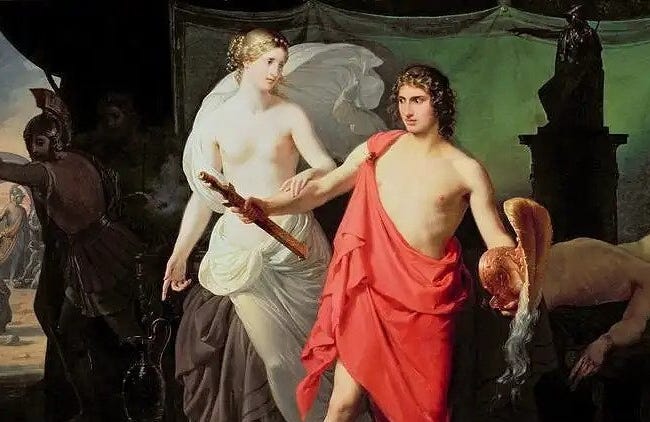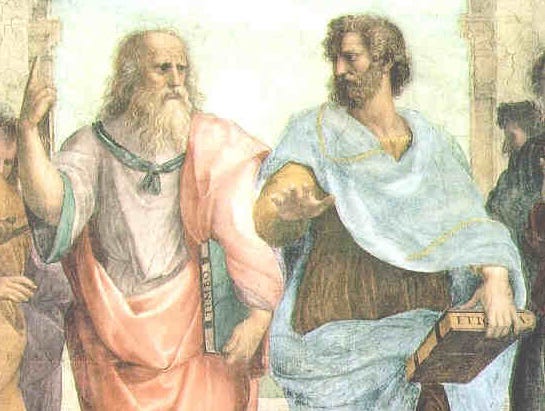Socrates’ Dream Woman of Phthia

by A.P. David
Unlike Socrates, Plato wrote—and wrote and wrote. This was a man who said, on a rare occasion in the first person, that his theories could not be expressed in writing. Just as inner contradiction is a key to effective drama, where we call it ‘conflict’, contradiction appears to be the fount and foil of philosophy. This is likely a reason why Plato was obsessed with the daimonic, galvanic impact of one peculiar man on the sophistic/philosophical movement that came to a head in fifth-century Athens. It was a man whom Plato had probably known all his life... it was none other than Socrates himself.
Athens was the birthplace of tragedy and comedy, and Plato was supposed to be a successor to Euripides and Agathon in tragedy. Instead, he fell victim to that indescribable pull of Socrates.
After that, only one person could be dramatized by Plato and it certainly wasn’t the traditional, mythic figures posed as Trojan horses. It could only be Socrates, who died for his sins. The man who sent Plato and his crowd into despair at his death would be the focalizing agent for Plato’s dramatic instinct.
Only with Socrates as reagent did the real drama happen for Plato, and consequently real thought could be dramatised.
Let us consider the passage from Crito about Socrates’ dream. Crito walks in on Socrates sleeping so peacefully that he does not wish to wake him up, despite the urgency of his business. We soon find out that the dream is about a gorgeous woman (though it was not likely an erotic dream in any embarrassing sense).
The woman was dressed in white, and καλή καὶ εὐειδής, ‘beautiful and shapely’. She came up to Socrates and called to him, saying, ὦ Σώκρατες, ἤματί κεν τριτάτῳ Φϑίην ἐρίβωλον ἵκοιο. ‘Socrates, on the third day wouldst thou come to fertile Phthia.’
‘Bizarre dream’ says Crito, Socrates’ wealthy age-mate and a man who seems to care more about Socrates as a human person than as a mentor or guru. ‘Seems pretty clear to me, Crito,’ says Socrates in response.
Well, what is clear about it? The beautiful woman is also a motherly figure who seems to know Homer’s works well.
The lines she recites come straight from Achilles, in his response to Odysseus in Book IX of the Iliad:
‘You will see, if you want, and if such things could concern you
At early dawn upon the fish-filled Hellespont sailing,
My own ships, and men in them eager to row;
If he should give us fair voyaging, Glorious Earth-Shaker,
On the third day I would reach deep soiled Phthia.’
Does this mean Socrates is identifying himself with Achilles? On his way to Phthia?
In some ways the Crito, depicting a private conversation that Plato must only have imagined, seems to show the public bravado that Socrates exhibited in his defence at the trial. He there associated himself with Achilles, which was surely not a winning thing to do, when he was ugly, old, and irritating. Was this in fact a genuine fantasy on Socrates’ part?
In the speech at the end of the Crito, Socrates connects himself to Achilles in the context of not deserting his post. Socrates, like Achilles, will stick to his life’s mission under fire. This is because Socrates is a servant of the Laws.
But wait a minute... Achilles actually was fantasising about returning to Phthia. Achilles was looking forward, in the form of a passive-aggressive threat, to deserting his post.
Whatever Socrates may have said at the end of the Crito, he has, in fact, had a dream of wish fulfillment. He has managed, while sleeping, to express his desire to escape the bitter degradation that he has suffered by submitting to Athens. Is it the same dishonour that embroiled Achilles who capitulated to the Achaean army?
No one knows where Achilles’ Phthia really was, but Phthia in historical times was a region of Thessaly. Thessaly, of course, is the ‘lawless place’ where Crito would like to smuggle Socrates. Does Crito understand Socrates’ wish, when he hears about the dream? Is that why he appears to ignore Socrates’ statement that the dream is clear, and presses his suit? Does Socrates want to go to Thessaly?
Context suggests that the woman in Socrates’ dream corresponds to Thetis, Achilles’ divine mother. This further proposes that we should be thinking about the alternative paths to death that Thetis presented to Achilles, in the Iliad. There is a long anonymous life at home, or a short but glorious life at Troy. This also is clear: going back to Phthia, for Achilles, to work on the farm, is the path not chosen.
How does this work in the dream analysis? Socrates wins eternal glory (Plato is the poet to thank for this) by sticking to his post and obeying the Laws. Does the clarity of his dream suggest that this is all a sham? That he would rather desert his thankless army and be received in the arms of a shapely woman, who is his original mother?
Socrates’ own reading of the dream is that it signifies something about the day he will die—the third day. Then Phthia becomes a kind of Hades. Is it possible that Socrates’ conception of the afterlife allowed him, at different times, to fulfill both of Achilles’ fates?
Perhaps it is only this aspect of the number of days that is clear to Socrates. The woman is a mystery. What sort of comfort or reward is her beauty? If you want to take in all of what is in front of you, do not forget her as you contemplate the speech of the Laws, and Socrates’ obligation to the state that is executing him. The ‘argument of the dialogue’ only emerges if you ignore her. Plato included her. Thus there is created a drama not of action but of thought. To resolve it is, is to kill it; meanwhile, Socrates lives.





